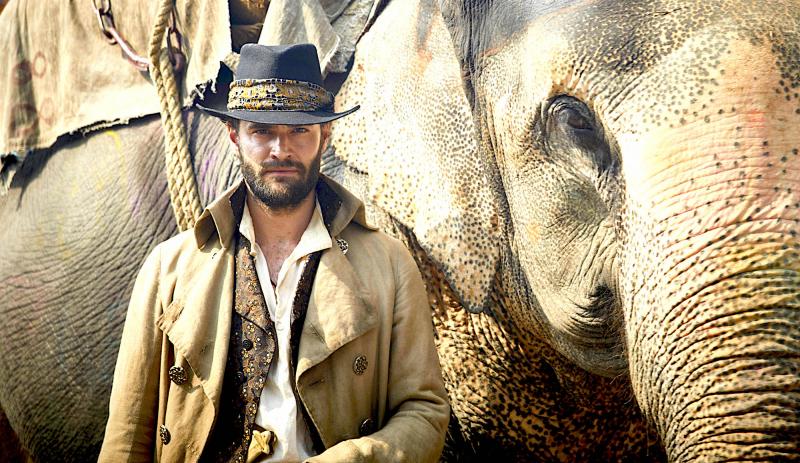Beecham House, ITV review - a cartoon version of 18th century India | reviews, news & interviews
Beecham House, ITV review - a cartoon version of 18th century India
Beecham House, ITV review - a cartoon version of 18th century India
Murky colonial history reborn as melodramatic fantasy

It has become routine to accuse Brexiteers of wanting to bring back the British Empire (though obviously it's OK to run an empire from Brussels), but the charge might more accurately be levelled at ITV.
Though I must admit, Beecham House doesn’t look much like Downton Abbey to me. True, it’s full of spectacular palaces peopled with wealthy potentates served by armies of staff, and instead of the Crawleys’ dogs and horses there are elephants and peacocks wandering in the grounds. But its depiction of Delhi in 1795 feels more like a fairytale concocted by the Indian division of Pixar than anything remotely connected to history.
As the Beatles (big fans of India themselves) once sang, “nothing is real”, and everything here looks painstakingly artificialised. The daylight has been mutated into a curious shade of fuzzy ginger, as if it were all taking place under enormous studio lamps using multicoloured filters, and what we see of India looks like mythological images from folklore rather than anybody’s everyday life. The show is saturated in background music, cloying orchestral schlock with a few Asian-style twiddly bits thrown in to evoke exoticness and rare spices from the East.
 It's more Trailfinders brochure than drama, though faint glimmers of plot occasionally seep in. The titular hero John Beecham wears a long dusty coat and hat, like Henry Fonda in Once Upon a Time in the West, and is played by rugged Tom Bateman as if he wants to give Poldark’s Aidan Turner a run for his money. He also wants you to know that he’s “a private man” on a serious mission. After spending many years as an employee of the rapacious East India Company, that notorious example of mercenary empire-building, he has turned his back on all that and now wants to set up as an honest trader, working in harmony with the Mughal emperors.
It's more Trailfinders brochure than drama, though faint glimmers of plot occasionally seep in. The titular hero John Beecham wears a long dusty coat and hat, like Henry Fonda in Once Upon a Time in the West, and is played by rugged Tom Bateman as if he wants to give Poldark’s Aidan Turner a run for his money. He also wants you to know that he’s “a private man” on a serious mission. After spending many years as an employee of the rapacious East India Company, that notorious example of mercenary empire-building, he has turned his back on all that and now wants to set up as an honest trader, working in harmony with the Mughal emperors.
His plan is to convince Emperor Shah Alam (Roshan Seth) of his bona fides and his good will, and acquire a trading licence in his own right, but he faces opposition from General Castillon (Grégory Fitoussi, pictured above). Castillon represents the French imperial interest, and naturally assumes that Beecham is working undercover for the East India mob.
There is clearly friction in store (and where are the Dutch, who fought a series of trade wars with the British?), but for now Beecham wants to settle down in stately Beecham House. He’s accompanied by his young child, August, and two Indian ladies, Chanchal and Maya, the nature of whose relationship to Beecham was kept coyly under wraps in this opening episode. As a special bonus he’s brought his old mum Henrietta over from England, played by none other than Lesley Nicol, Downton Abbey’s no-nonsense cook Mrs Patmore. She hasn't seen him for 12 years, and seems to think her son will be delighted to marry her travelling companion, Violet. She may have another think coming.
Add comment
The future of Arts Journalism
You can stop theartsdesk.com closing!
We urgently need financing to survive. Our fundraising drive has thus far raised £49,000 but we need to reach £100,000 or we will be forced to close. Please contribute here: https://gofund.me/c3f6033d
And if you can forward this information to anyone who might assist, we’d be grateful.

Subscribe to theartsdesk.com
Thank you for continuing to read our work on theartsdesk.com. For unlimited access to every article in its entirety, including our archive of more than 15,000 pieces, we're asking for £5 per month or £40 per year. We feel it's a very good deal, and hope you do too.
To take a subscription now simply click here.
And if you're looking for that extra gift for a friend or family member, why not treat them to a theartsdesk.com gift subscription?
more TV
 In Flight, Channel 4 review - drugs, thugs and Bulgarian gangsters
Katherine Kelly's flight attendant is battling a sea of troubles
In Flight, Channel 4 review - drugs, thugs and Bulgarian gangsters
Katherine Kelly's flight attendant is battling a sea of troubles
 Alien: Earth, Disney+ review - was this interstellar journey really necessary?
Noah Hawley's lavish sci-fi series brings Ridley Scott's monster back home
Alien: Earth, Disney+ review - was this interstellar journey really necessary?
Noah Hawley's lavish sci-fi series brings Ridley Scott's monster back home
 The Count of Monte Cristo, U&Drama review - silly telly for the silly season
Umpteenth incarnation of the Alexandre Dumas novel is no better than it should be
The Count of Monte Cristo, U&Drama review - silly telly for the silly season
Umpteenth incarnation of the Alexandre Dumas novel is no better than it should be
 The Narrow Road to the Deep North, BBC One review - love, death and hell on the Burma railway
Richard Flanagan's prize-winning novel becomes a gruelling TV series
The Narrow Road to the Deep North, BBC One review - love, death and hell on the Burma railway
Richard Flanagan's prize-winning novel becomes a gruelling TV series
 The Waterfront, Netflix review - fish, drugs and rock'n'roll
Kevin Williamson's Carolinas crime saga makes addictive viewing
The Waterfront, Netflix review - fish, drugs and rock'n'roll
Kevin Williamson's Carolinas crime saga makes addictive viewing
 theartsdesk Q&A: writer and actor Mark Gatiss on 'Bookish'
The multi-talented performer ponders storytelling, crime and retiring to run a bookshop
theartsdesk Q&A: writer and actor Mark Gatiss on 'Bookish'
The multi-talented performer ponders storytelling, crime and retiring to run a bookshop
 Ballard, Prime Video review - there's something rotten in the LAPD
Persuasive dramatisation of Michael Connelly's female detective
Ballard, Prime Video review - there's something rotten in the LAPD
Persuasive dramatisation of Michael Connelly's female detective
 Bookish, U&Alibi review - sleuthing and skulduggery in a bomb-battered London
Mark Gatiss's crime drama mixes period atmosphere with crafty clues
Bookish, U&Alibi review - sleuthing and skulduggery in a bomb-battered London
Mark Gatiss's crime drama mixes period atmosphere with crafty clues
 Too Much, Netflix - a romcom that's oversexed, and over here
Lena Dunham's new series presents an England it's often hard to recognise
Too Much, Netflix - a romcom that's oversexed, and over here
Lena Dunham's new series presents an England it's often hard to recognise
 Insomnia, Channel 5 review - a chronicle of deaths foretold
Sarah Pinborough's psychological thriller is cluttered but compelling
Insomnia, Channel 5 review - a chronicle of deaths foretold
Sarah Pinborough's psychological thriller is cluttered but compelling
 Live Aid at 40: When Rock'n'Roll Took on the World, BBC Two review - how Bob Geldof led pop's battle against Ethiopian famine
When wackily-dressed pop stars banded together to give a little help to the helpless
Live Aid at 40: When Rock'n'Roll Took on the World, BBC Two review - how Bob Geldof led pop's battle against Ethiopian famine
When wackily-dressed pop stars banded together to give a little help to the helpless
 Hill, Sky Documentaries review - how Damon Hill battled his demons
Alex Holmes's film is both documentary and psychological portrait
Hill, Sky Documentaries review - how Damon Hill battled his demons
Alex Holmes's film is both documentary and psychological portrait

Comments
Can't quite believe what I'm